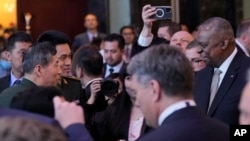A top Chinese defense official has spoken with U.S. Defense Secretary Lloyd Austin, potentially signaling a thaw in relations after Beijing rejected multiple U.S. requests for discussions.
The brief exchange between Austin and Chinese Minister of National Defense Li Shangfu took place late Friday at the opening of the Shangri La Dialogue in Singapore.
Pentagon press secretary Brigadier General Pat Ryder said Austin and Li “spoke briefly.”
“The two leaders shook hands, but did not have a substantive exchange,” Ryder added in a statement.
Tensions between the U.S. and Chinese militaries has been steadily rising since the U.S. discovered and shot down what it said was a Chinese spy balloon off the coast of South Carolina, after it traversed across much of the country.
Pentagon officials said they requested a call immediately after the shootdown but that the request, and multiple similar requests that followed, were rejected.
More recently, U.S. defense officials have been warning of an “alarming increase” in Chinese aggression in the skies and on the seas, highlighted by what U.S. officials described as a “risky” intercept of a U.S. RC-135 aircraft over the South China Sea last week by a Chinese fighter jet.
U.S. officials emphasized that such incidents only highlight the need for more dialogue.
“The department believes in maintaining open lines of military-to-military communication with the [Peoples Republic of China] — and will continue to seek meaningful military-to-military discussions at multiple levels to responsibly manage the relationship,” Ryder said.
It is unclear whether additional talks between Austin and Li are planned during the remainder of the Shangri La Dialogue.
Austin speaks to the group Saturday, while Li is set to address the group Sunday.
The annual dialogue, considered the premier Asian defense summit, features defense ministers and politicians, as well as senior military officers, diplomats, weapons makers and international security analysts from the Asia Pacific, Europe and North America.
The summit is taking place against a tense international backdrop that includes Russia’s invasion of Ukraine, China’s support of Russia, and China’s increasingly aggressive moves against Taiwan.
